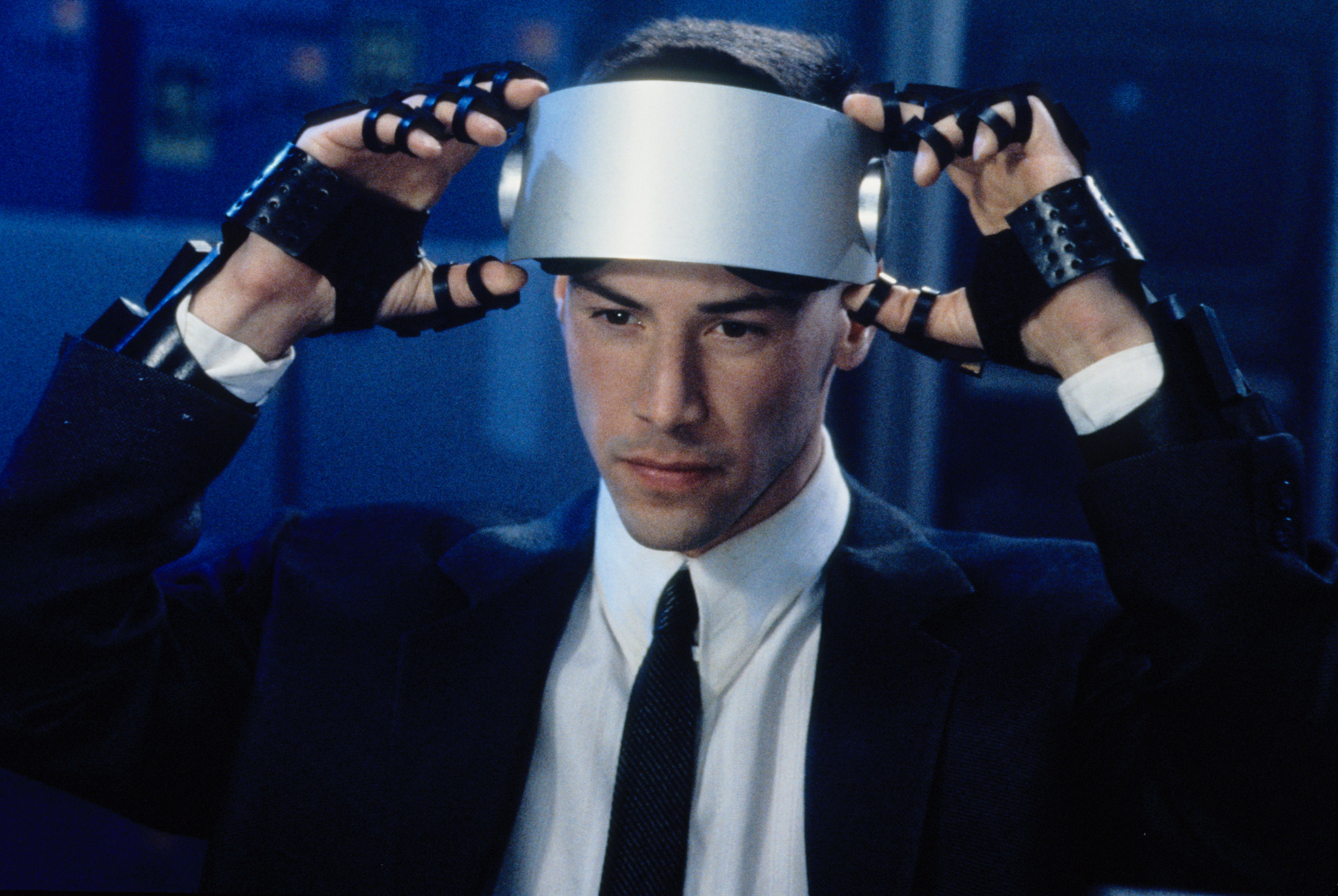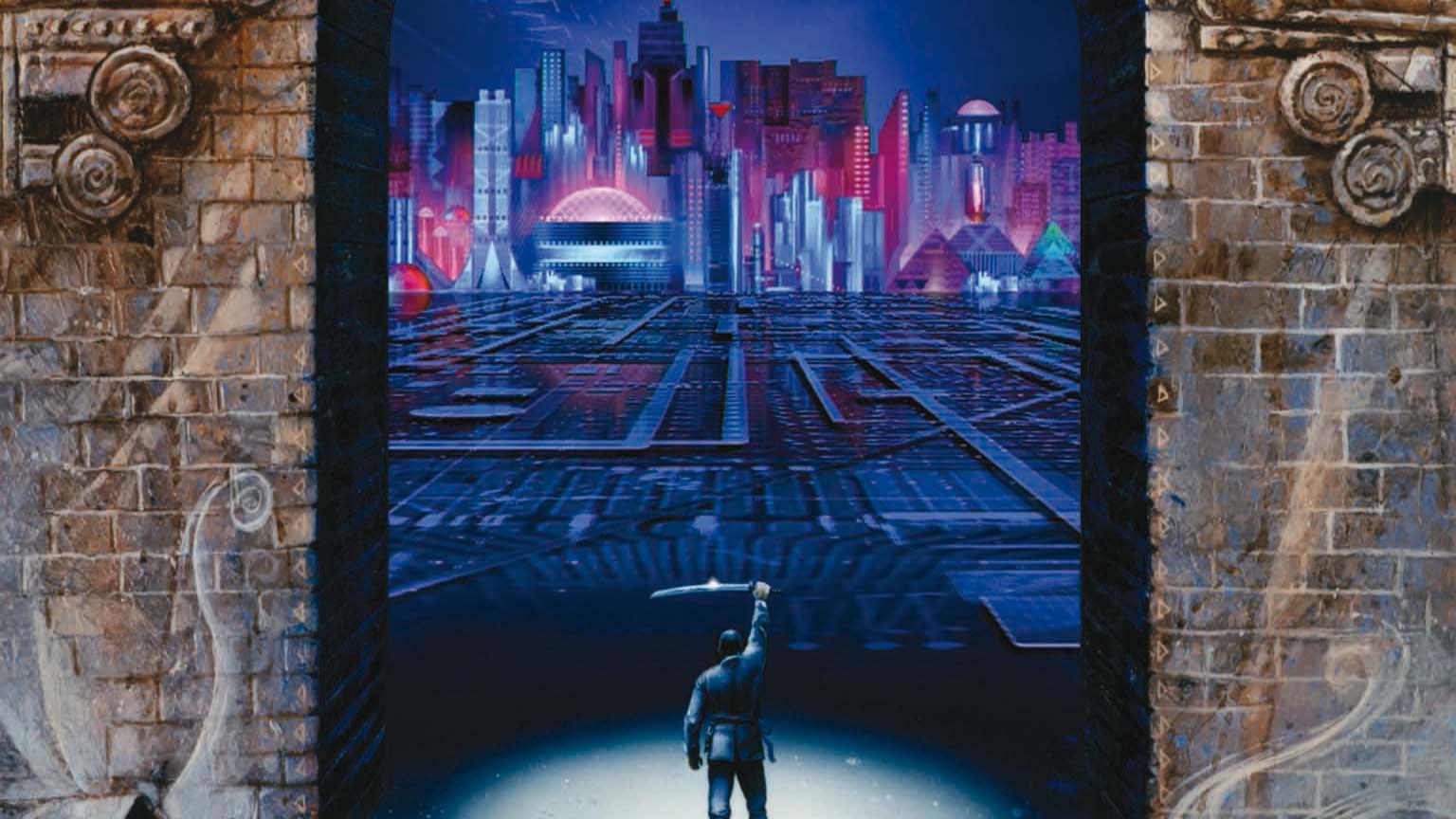The metaverse is bullshit
You're not losing your mind: it really does just sound like a worse version of the internet.

We have Neal Stephenson's 1992 novel Snow Crash to thank for popularizing avatars as our digital personas, from early internet message boards to full-body VRChat. We also have Snow Crash to blame for the absolute hell we find ourselves in today, as every tech billionaire on the planet slobber all over themselves as they declare the metaverse—the next phase of human culture!!—is within reach. Games, NFTs, crypto, VR, AR, the blockchain, they're all wrapped up in this idea of a virtually-integrated society in which our Fortnite costumes will carry over to our Onlyfans accounts and we will never, ever have to log off.
The absurdity of it makes me want to scream, or maybe die, or maybe just spoon out the part of my brain that knows what an NFT is. But there's one thing that keeps me going:
The absolute gleeful, cackling, deep-in-my-bones certainty that it's all complete bullshit.
If you also know deep in your heart that the metaverse is a big fat steaming load of billionaire nerd pabulum, I hope reading these words provides you with a wave of vindicating comfort. You're not crazy. I know it can feel like that when the people peddling these things seem so convinced that they're the future, like they know something you don't. Don't fall for it. Watching people spend $69 million in fake money to buy a JPEG should make you feel like you're living in an age of unparalleled nonsense.
That feeling isn't going to go away. For the next decade we'll all be asking ourselves if the whole world's gone mad at least once a week. But the good news is that the metaverse and the tech industry's very expensive obsession with trying to make it a reality will be a schadenfreude generator the likes of which we've never seen before.
We will all become the living embodiments of the one true expression of being online in the 21st century:

The metaverse is bullshit because it already exists, and it's called the internet
Being 'inside' a virtual world was never really the important part
When Epic's Tim Sweeney and Facebook's Mark Zuckerberg talk about the metaverse, they're primarily drawing from the foundational visions of cyberspace created by science fiction authors like William Gibson and Neal Stephenson. Their books in the '80s and early '90s looked at what computers were capable of at the time and imagined them decades in the future, just abstract enough to let our imaginations run.
Keep up to date with the most important stories and the best deals, as picked by the PC Gamer team.
Here's Gibson's description of cyberspace in Neuromancer (1984):
"A consensual hallucination experienced daily by billions of legitimate operators, in every nation... A graphic representation of data abstracted from the banks of every computer in the human system. Unthinkable complexity. Lines of light ranged in the nonspace of the mind, clusters and constellations of data. Like city lights, receding."
And here's a snippet of Stephenson's description of the metaverse in Snow Crash (1992):
"Your avatar can look any way you want it to, up to the limitations of your equipment. If you're ugly, you can make your avatar beautiful. If you've just gotten out of bed, your avatar can still be wearing beautiful clothes and professionally applied makeup. You can look like a gorilla or a dragon or a giant talking penis in the Metaverse. Spend five minutes walking down the Street and you will see all of these."
Both novels were prescient and profoundly influential. Alongside movies like Tron, they shaped '80s and '90s depictions of what it would look like to be inside a computer, from rudimentary early VR to movies like The Matrix. In 2012, Michael Abrash—who has worked at Microsoft, id Software, Valve, and Oculus—wrote that his game development career "all started with Snow Crash."
"[John Carmack] talked about persistent internet game servers," he wrote, "about people building their own levels and running them on their own servers, and about how it would be possible to connect them together so players could go from one to another... I realized that what he was really talking about was a Metaverse—less glamorous than Neal's creation, but, amazingly, gloriously, unbelievably real."

Men in tech have been chasing this vision of the metaverse for a long time, but their vision for what qualifies as the real metaverse keeps being pushed further and further to the horizon because they're chasing a science fiction vision that never had to be justified beyond a few sentences of enticing description. Being "inside" a virtual world was never really the important part.
Gibson and Stephenson were conjuring up spaces that made for entertaining stories you could picture in your head, where characters could do things other than sitting at monitors typing. Tech companies are now spending billions of dollars straining against that basic fact: For most of what we do online, sitting at a monitor and typing is going to be the most practical interface for a very long time.
The internet as we know it is so much bigger than Stephen's metaverse because it's *not* just one shared environment
We've had a perfectly functional version of Gibson's cyberspace since the popularization of the World Wide Web in the mid '90s (or earlier if you were into BBSes). We created the metaverse when millions (now billions!) of devices became connected simultaneously, able to access information from anywhere, linking people across continents in mere seconds. The point was never that cyberspace needed to look like the internet in Johnny Mnemonic. Can you imagine having to use that shit just to make a phone call?
Hell, even Gibson said that his description of cyberspace was basically just supposed to sound really cool:
"All I knew about the word 'cyberspace' when I coined it, was that it seemed like an effective buzzword. It seemed evocative and essentially meaningless. It was suggestive of something, but had no real semantic meaning, even for me, as I saw it emerge on the page."
As for The Street, Stephenson's metaverse equivalent of the Las Vegas strip where anyone can take on an avatar to escape the crushing reality of their normal existence: That's just fucking Second Life. We made a virtual world where you can do anything (including being advertised to by Toyota) in 2003.
Or maybe The Street is World of Warcraft, or VRChat. The internet as we know it is so much bigger than Stephen's metaverse because it's not just one shared environment. It's vastly more flexible, a connecting medium for whatever broad or niche virtual worlds we want to create.
Why don't the tech billionaires chasing after sci-fi metaverses get that these fictional virtual realities seem great on the page but would be hell to actually live in 12 hours a day? I truly do not know, but I think it may have something to do with their refusal to admit that they are the baddies.
The metaverse is bullshit because tech moguls missed the part where cyberpunk is dystopian

More than NFTs or cryptocurrency or any of the other brain-melting nonsense tied up in the tech landscape, this is the part that truly makes me want to stick my entire fist in my mouth and bite down. The push to create the metaverse, at least from companies like Epic and Facebook, seems entirely built on a teenage boy's reading of Snow Crash: zeroing in on the awesome vision of future technology while totally missing the book's satirical skewering of capitalism.
The very first chapter of Snow Crash starts by describing the high tech gear and elite skills of Hiro Protagonist, aka The Deliverator, aka a former programmer who now delivers pizzas, and there is only one pizza company, run by the mafia, and most of America has been carved up into corporate fiefdoms.
Stephenson's writing is so fun that I guess you could, maybe, misinterpret a society run by the pizza mafia as a good thing. But Tim Sweeney and Mark Zuckerberg don't see themselves as pizza mob bosses. They keep floating these visions of a utopian metaverse that's all about people talking to one another in a virtual utopia, even as they sit atop massive companies that use piles of money to reshape the internet as they see fit.
In a September 2021 Washington Post interview, Tim Sweeney imagined the future of advertising. "A carmaker who wants to make a presence in the metaverse isn't going to run ads," he said. "They're going to drop their car into the world in real time and you'll be able to drive it around. And they're going to work with lots of content creators with different experiences to ensure their car is playable here and there, and that it's receiving the attention it deserves."
But how is a virtual car tempting you to drive it in the metaverse—aided by an army of "content creators"—any better than watching a YouTube pre-roll ad? Extrapolate this out, and the metaverse will be a place where advertisement and authenticity are even harder to tell apart. It's a commercial dream, not a creative one.
If Facebook—sorry, Meta—is one of the key drivers of the metaverse, then of course it will have some new spin on the ad-laden news feed. It'll just be a natural extension of the gig economy, some poor soul being paid .00000000001 bitcoin an hour to virtually dress up like a carnival barker and shout about the latest horrible news out of Syria on some virtual street corner. And if Epic somehow created Sweeney's utopian metaverse, it would still be built to promote Epic's own interests and profit above all else. There's no way for any massive tech company to build the metaverse without becoming the villains.
The metaverse is bullshit because its promised cross-compatibility doesn't actually work

Perhaps the most cited claim about the metaverse as it pertains to gaming is that it's the key to uniting our digital lives into an ur-account. The magic of the blockchain will then let us, say, "own" and access the same weapon across Diablo and New World, or sell the ring we spent a month grinding to get for real money (and by real money I mean cryptocurrency that constantly fluctuates in theoretical value). This hyped up interoperability ignores about a thousand problems with how games are made.
MMO veteran Raph Koster has recently written a series of articles breaking down how game objects work, and he tackles the many difficulties of making even simple items carry between games. "We should not underestimate the magnitude of the task of figuring out what value a cooked pie from Breath of the Wild has in Halo—or mapping every game to every other game," he says.
"There are no standards right now for 'what things can do' in a virtual world, and we shouldn’t want them. The act of setting the standard is also setting the limit, which would curb creativity enormously. There's far too much possibility to be explored still."
Koster does go on to talk about how it can work, but technical possibility still runs headfirst into design challenges, even with something as simple as, say, an apple. For example: "If you can carry food to a new world and eating restores health, that might really unbalance a game where you aren't supposed to be able to heal at all." Or: "A survival game might want actual nutritional values rather than a single 'food' value."
Does every metaverse-compatible game just become a mushy Fortnite glob of everything mixed together? During Facebook's metaverse presentation, John Carmack called metaverse development as it exists today "a honeypot trap for architecture astronauts," aka "programmers or designers who want to only look at things from the very highest levels."
The people currently hyping this technology seem to have little or no experience even making "normal" games that don't grapple with these problems, as if citing the right buzzwords can make an idea reality. Take Decentraland, a Second Life for crypto fans that was barren when we explored it. It apparently has enough life in it to hold an in-game festival with Deadmau5 and Paris Hilton DJing, which this metaverse-focused blog claimed, "really showcased what amazing feats can be achieved within Metaverse spaces."
It looks like a real party:
There are plenty of other blockchain-based games. The Six Dragons, for example, which looks like the fake version of Skyrim someone would mock up for an episode of Law & Order (a common aesthetic in these circles). These games typically market themselves on the plain novelty of being "decentralized" or player-owned in some vague way, but I've yet to see one pitch itself as a unique videogame. The metaverse can't exist just for the sake of justifying itself.
The metaverse is bullshit because no one can actually explain why it's better
Someone alive on the planet earth may be able to convince me that the metaverse truly is the future of human interaction. Don Draper could do it, and make me weep in the process. But so far it's clear that in the same way William Gibson coined cyberspace as "evocative and essentially meaningless," the Zuckerbergs and Sweeneys pitching the metaverse claim it's the future without any convincing arguments for why it should exist.
What do we truly have to gain by trying to merge all entertainment into one giant Ivan Ooze of content?
Zuckerberg calls the metaverse "an embodied internet where you're in the experience, not just looking at it." Has he used the internet? Actually? How much of it would you like to embody?
Zuckerberg talks a lot of shit about screens, but the great thing about screens is that they only require a portion of your attention, not complete sensory immersion.
In an hour-and-a-half keynote, the only real ideas Facebook presented for living in the metaverse were having a virtual version of your house (made up of crappy 3D rendered objects), attending virtual meetings (so you can't even turn off your camera if you're feeling Zoom fatigue) and having a virtual workspace instead of a physical one (never mind how clunky and awkward a virtual desktop is compared to a real one). So much development on the metaverse is focusing on recreating worse versions of things we already have in the real world. This metaverse pitch, seemingly, is just another avenue for selling people the same crap.

In an interview earlier, Sweeney said that the killer feature of the metaverse will be "you and your friends together having great social experiences" and "being in a 3D world, interacting together." He uses Fortnite as an example. But what about the metaverse will make that experience better? We've been playing games and chatting for decades! What do we truly have to gain by trying to merge all entertainment into one giant Ivan Ooze of content?
Social media and telecom companies are evidence enough that consolidation is bad. Even when we get amazing AR glasses that let us play a more realistic Pokémon Go, I don't need that Pokémon to carry over to my crappy metaverse mansion. Even when we get brain computer interfaces, I don't want to live in the embodied internet, because tactile sensation is a huge part of how we experience the world, and clicking a mouse feels better than making a finger gun in empty air.
Tech companies are going to keep pushing the metaverse, and eventually we'll all have to deal with it. But in the meantime, don't feel like you've lost your mind when every pitch for it feels absolutely meaningless. The metaverse is most definitely bullshit.

Wes has been covering games and hardware for more than 10 years, first at tech sites like The Wirecutter and Tested before joining the PC Gamer team in 2014. Wes plays a little bit of everything, but he'll always jump at the chance to cover emulation and Japanese games.
When he's not obsessively optimizing and re-optimizing a tangle of conveyor belts in Satisfactory (it's really becoming a problem), he's probably playing a 20-year-old Final Fantasy or some opaque ASCII roguelike. With a focus on writing and editing features, he seeks out personal stories and in-depth histories from the corners of PC gaming and its niche communities. 50% pizza by volume (deep dish, to be specific).


